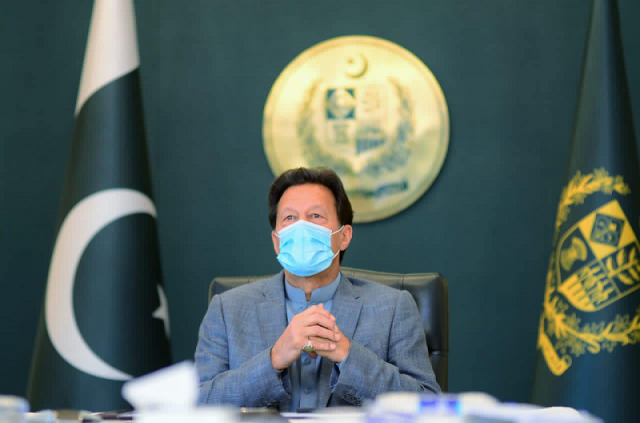PM disapproves abrupt subsidy withdrawal
Directs economic team to take a gradual approach to protect the people

Prime Minister Imran Khan on Monday did not approve the plan to immediately withdraw subsidies but directed to take a gradual approach aimed at protecting the people, particularly the middle-income group, who are now more exposed to spike in food and energy prices.
The premier chaired a meeting to review the status of the government subsidies on wheat, sugar, electricity and gas and the focus largely remained on whether or not to continue Rs100 billion annual subsidies on wheat flour, at least three participants of the meeting told The Express Tribune.
There was a proposal to reduce the wheat-related subsidies to Rs66 billion in the next fiscal year, which did not get endorsement during the meeting, the sources said.
Planning Minister Asad Umar and Special Assistant to PM on Power Tabish Gohar opposed the move to immediately withdraw the subsidies due to their adverse impact on the middle- and upper-income groups, along with those who are already cross-subsidising.
Former finance minister Shaukat Tareen, who is now tipped to replace Hammad Azhar, also attended the subsidies’ meeting, which was chaired by the prime minister, the sources said. Tareen was not available for comments. Tareen also separately met with Imran Khan on Monday.
As part of the International Monetary Fund (IMF) conditions, the government was working whether to give only targeted subsidies on various commodities and utilities and increase the electricity prices to reduce the circular debt. There are at least three new conditions in the IMF programme that seek to end the subsidies, particularly on electricity, the IMF documents showed.
The government’s reluctance to immediately take tough measures was also apparent in a video conference between the teams of Pakistan and the IMF, according to the sources privy to these discussions.
The Pakistani side was led by Hammad Azhar, who is holding the additional portfolio of finance minister, and the IMF was represented by its Managing Director Kristalina Georgieva.
The sources said that the Pakistani authorities showed their resolve to the reforms agreed with the IMF. But they indicated that these steps may not be taken as per the earlier commitments given in the Memorandum of Economic and Financial Policies (MEFP), submitted by former finance minister Hafeez Shaikh and SBP Governor Reza Baqir.
Last week, Premier Imran, Finance Minister Azhar and Tareen have all indicated renegotiating the IMF deal, which seeks to put around Rs1.5 trillion additional burden on the people in the next six months.
“[I] had a productive virtual meeting with the IMF MD on state of Pakistan’s economy and implementation of reforms. [I am] grateful that she acknowledged the positive economic indicators and the need to keep the welfare of people of Pakistan as the focus of all our policy endeavours,” Azhar tweeted after the meeting.
The sources said Pakistani authorities showed their resolve to continue with the reforms but they informed the IMF head that the unfolding situation due to the third wave of the deadly pandemic may delay some of these measures.
“I commended Pakistan’s response to the health and economic crisis, and we discussed the way forward for vital economic reforms and external financing needed to build a better future for Pakistan’s people,” Georgieva said.
The key issue was whether to increase electricity prices by further 36%, as committed by Pakistan with the IMF just last month.
The Power Division will take the targeted electricity subsidies plan with a new roadmap for the approval of the prime minister next week, said Gauhar.
He said it was discussed during Monday’s meeting that any reduction in the power subsidies should be gradual to avoid any collateral adverse impact on electricity demand and affordability for the “unprotected” categories of consumers to be defined.
Last week, a report by the IMF stated that Pakistan’s cabinet approved a timetable for the outstanding power price adjustments, which include the fiscal year 2020-21 annual rebasing equal to Rs3.34 per unit hike in the base tariff and quarterly tariff adjustments of Rs1.63 per unit to catch up with past deferrals.
In the next step, the government has committed to further increase annual base tariffs by June 1, 2021 and fourth quarterly increase of last fiscal year by end-September 2021, according to the IMF documents.
But the Power Division officials said that these plans were subject to review in light of new ground realities. The government was now considering various options like a reduction in sales tax on electricity and shutting down the expensive furnace oil-based power plants to reduce the required increase in tariffs to end the circular debt.
There was also an issue of further imposition of taxes to reduce the budget deficit in the next fiscal year. The MEFP has underlined that in the next step, the government would change both general sales tax (GST) and personal income tax rates with the fiscal year 2021-22 budget, yielding an estimated 1.1% of GDP or Rs570 billion.
The tax measures on account of federal excise duty and customs duties are expected to be over and above these measures, which will bring the total burden of additional taxes to around Rs700 billion, according to the FBR sources.



















COMMENTS
Comments are moderated and generally will be posted if they are on-topic and not abusive.
For more information, please see our Comments FAQ